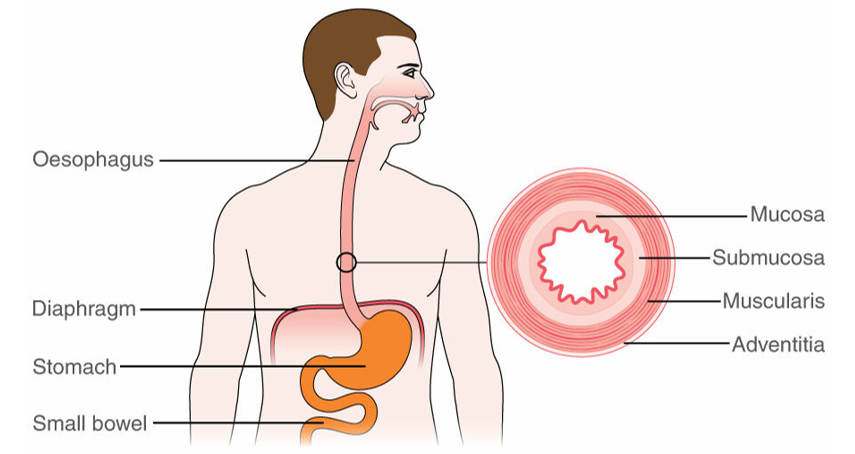The oesophagus is part of your digestive system and is also known as the food pipe or gullet. Around 9,000 people are diagnosed with oesophageal cancer in the UK each year.
There are two main types of oesophageal cancer:
- squamous cell carcinoma – this develops in the thin, flat cells of the mucosa, which line the oesophagus
- adenocarcinoma – this develops in the glandular cells of the submucosal lining of the oesophagus, which produce mucus
A cancer can occur anywhere along the length of the oesophagus. Squamous cell cancers occur more commonly in the upper and middle regions. Adenocarcinomas tend to be more common at the lower end, including the junction where the oesophagus joins the stomach.
Over 95% of oesophageal cancers are squamous cell carcinomas or adenocarcinomas.
There are other rarer types of cancer of the oesophagus.
Meet the Gastrointestinal (GI) team.
Am I at risk?
We do not know exactly what causes oesophageal cancer. But certain things called risk factors can increase the chance of developing it. These are:
- Long term acid reflux
- Being overweight
- Gender– Oesophageal cancer is more common in men than in women
- Age– risk increases with age. Most oesophageal cancers are diagnosed in people over the age of 40
- Smoking
- Drinking a lot of alcohol over a long period of time
- Eating a diet that is high in fat and cholesterol
- Previous cancer treatment– radiotherapy to the chest area can increase your risk of developing oesophageal cancer
For more information on the risk factors of oesophageal cancer, please follow this link.
Symptoms of oesophageal cancer
Some symptoms of oesophageal cancer can be like the symptoms of other common conditions. Symptoms include:
- Difficulty swallowing (called dysphagia)
- Vomiting
- Pain when swallowing
- Weight loss
- Pain in your throat or discomfort behind the breastbone or in the back
- Indigestion or heartburn that doesn’t go away
- A cough that won’t go away
- Hoarseness
- Coughing up blood
- Dark poo
For more information on the symptoms of oesophageal cancer, please follow this link.
Patient information
For more information from Macmillan regarding oesophageal cancer, please follow this link.
For more information from Cancer Research UK regarding oesophageal cancer, please follow this link.
